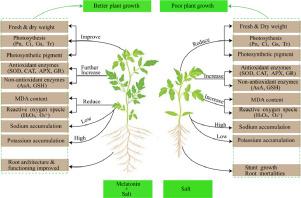Scientia Horticulturae ( IF 3.9 ) Pub Date : 2021-04-03 , DOI: 10.1016/j.scienta.2021.110145 Muhammad Ahsan Altaf , Rabia Shahid , Ming-Xun Ren , Muhammad Mohsin Altaf , Latif Ullah Khan , Sidra Shahid , Mohammad Shah Jahan

|
Tomato is considered an important vegetable crop for studying the response to abiotic stresses, which deteriorate the growth and development of plants, particularly salt stress. Melatonin is a crucial pleiotropic nontoxic signaling molecule that has a various role in modulating of plant responses to environmental stresses. The purpose of the study was to reckon the alleviating effects of melatonin on tomato plant growth and development in salinity condition. The results exhibited that the pretreatment of tomato seedlings with 100 μM melatonin for 3 days effectively improved the root architecture, photosynthetic pigments, photosynthetic assimilation and growth status of plants under subsequent salt stress (150 mM). The pretreatment slashed sodium ions concentration in leaf and stem by checking sodium ions transport from roots to shoot. Furthermore, melatonin notably surged potassium contents. Melatonin pretreatment (3 days) followed by salinity exposure (7 days) efficiently lowered the oxidative stress by checking the over accumulation of superoxide (O2•−) and hydrogen peroxide (H2O2), reducing the malondialdehyde (MDA) content and electrolyte leakage (EL). This was associated with increased activities of enzymatic antioxidants [superoxide dismutase (SOD), catalase (CAT), glutathione reductase (GR) and ascorbate peroxidase (APX)] and non-enzymatic antioxidants [ascorbic acid (AsA) and glutathione (GSH)]. In conclusion, melatonin pretreatment significantly escalates the salinity tolerance of tomato seedlings by scavenging the excessive ROS and improving cellular membrane stability of, thus mitigating salinity-induced oxidative damage.
中文翻译:

褪黑素减轻了番茄幼苗的盐分损害:根系体系,光合能力,离子稳态和抗氧化酶分析
番茄被认为是研究非生物胁迫响应的重要蔬菜作物,非生物胁迫使植物的生长发育特别是盐胁迫恶化。褪黑素是至关重要的多效性无毒信号分子,在调节植物对环境胁迫的反应中具有多种作用。该研究的目的是确定褪黑激素在盐度条件下对番茄植物生长发育的缓解作用。结果表明,用100μM褪黑素预处理番茄幼苗3天有效地改善了盐胁迫(150 mM)下植物的根系结构,光合色素,光合同化和生长状况。预处理通过检查钠离子从根部到芽的运输来降低叶片和茎中钠离子的浓度。此外,褪黑素明显增加了钾含量。褪黑素预处理(3天),然后暴露于盐度(7天),通过检查超氧化物(O)的过度积累,有效降低了氧化应激2 •−)和过氧化氢(H 2 O 2),可降低丙二醛(MDA)含量和电解液泄漏(EL)。这与酶抗氧化剂[超氧化物歧化酶(SOD),过氧化氢酶(CAT),谷胱甘肽还原酶(GR)和抗坏血酸过氧化物酶(APX)]和非酶抗氧化剂[抗坏血酸(AsA)和谷胱甘肽(GSH)]的活性增加有关。 。总之,褪黑激素预处理通过清除过量的ROS并改善其细胞膜稳定性,从而显着提高了番茄幼苗的耐盐性,从而减轻了盐度引起的氧化损伤。











































 京公网安备 11010802027423号
京公网安备 11010802027423号